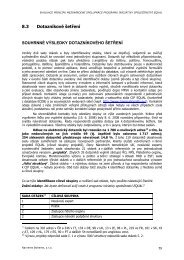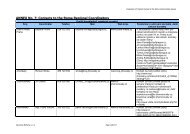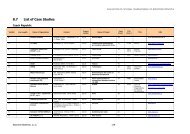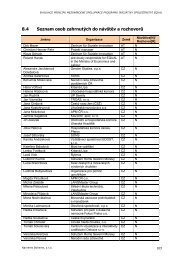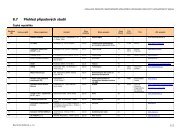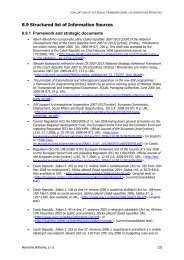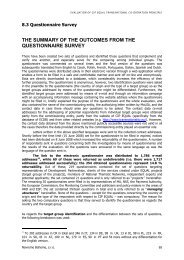EQUAL - Final report - eng - navreme
EQUAL - Final report - eng - navreme
EQUAL - Final report - eng - navreme
Create successful ePaper yourself
Turn your PDF publications into a flip-book with our unique Google optimized e-Paper software.
EVALUATION OF CIP <strong>EQUAL</strong> TRANSNATIONAL CO-OPERATION PRINCIPLE<br />
Graph 3: Structure of all processed questionnaires from set of questions no.2 (managing structures) according to<br />
the respondent’s country of origin (in total 34 questionnaires; the respondents from the Czech Republic represent<br />
ca. 23,5 %)<br />
11<br />
10<br />
9<br />
8<br />
7<br />
6<br />
5<br />
4<br />
3<br />
2<br />
1<br />
0<br />
8<br />
Czech Republic<br />
3 3<br />
United Kingdom<br />
Austria<br />
Countries<br />
[managing structures]<br />
2 2 2<br />
THE RETURNABILITY OF QUESTIONNAIRES<br />
Poland<br />
France<br />
Portugal<br />
1 1 1<br />
0 0<br />
As it has been already stated herein above, in total, there were received 254 questionnaires,<br />
while there were 1,717 e-mail addresses addressed successfully; thus, the returnability of<br />
questionnaires is 14.8 %. The questionnaire was distributed on-line in the following language<br />
versions: Czech, English, Italian, French, Dutch, Spanish, Portuguese, and Polish. Although the team<br />
took a decision (despite the original offer that was counting only on the Czech and English versions)<br />
to translate the questionnaire to the languages of all eleven countries where the investigations were<br />
effected (or rather ten because in case of Slovakia good knowledge of Czech was expected), the step<br />
did not positively lead to increased returnability. Availability of a particular language version thus has<br />
no direct causal connection with the returnability of questionnaires, in our case this is true especially<br />
as regards France and Italy, where the returnability is far below the average, contrary to the high<br />
returnability achieved in the case of addresses targeted with the invitation to participate written in<br />
English despite probably addressing persons of various nationalities – those were generic domains<br />
(e.g. .com, .org, etc), and especially representatives of CIP <strong>EQUAL</strong> managing structures and<br />
representatives of the European Commission (under the “other country” section in the graph).<br />
Graph 4 shows that Portugal, Poland, the Netherlands, the Czech Republic, the United Kingdom and<br />
undifferentiated countries are above the average returnability, while all the other countries are below<br />
the average. The dark blue column marks the number of filled in questionnaires, and the rest of the<br />
column the number of addressed addresses per respective country. The red points mark the<br />
questionnaire returnability per respective country. Hereto, we add the following methodological note:<br />
while the number of the addressed shows the numbers of e-mail addresses with the proper national<br />
domain (e.g. the number of addresses ending with .de means the number of addresses addressed in<br />
Germany); the filled-in questionnaires were differentiated by countries, not by home domains because<br />
the questionnaires were anonymous, and so the country that a respondent stated at the beginning of<br />
the questionnaire. Theoretically, it is therefore possible that a respondent from Brussels stated<br />
Germany as the country of origin, but having been addressed by the English version of the letter as<br />
Navreme Boheme, s.r.o. 68<br />
Germany<br />
Spain<br />
The Netherlands<br />
Italy<br />
Slovakia<br />
11<br />
other



